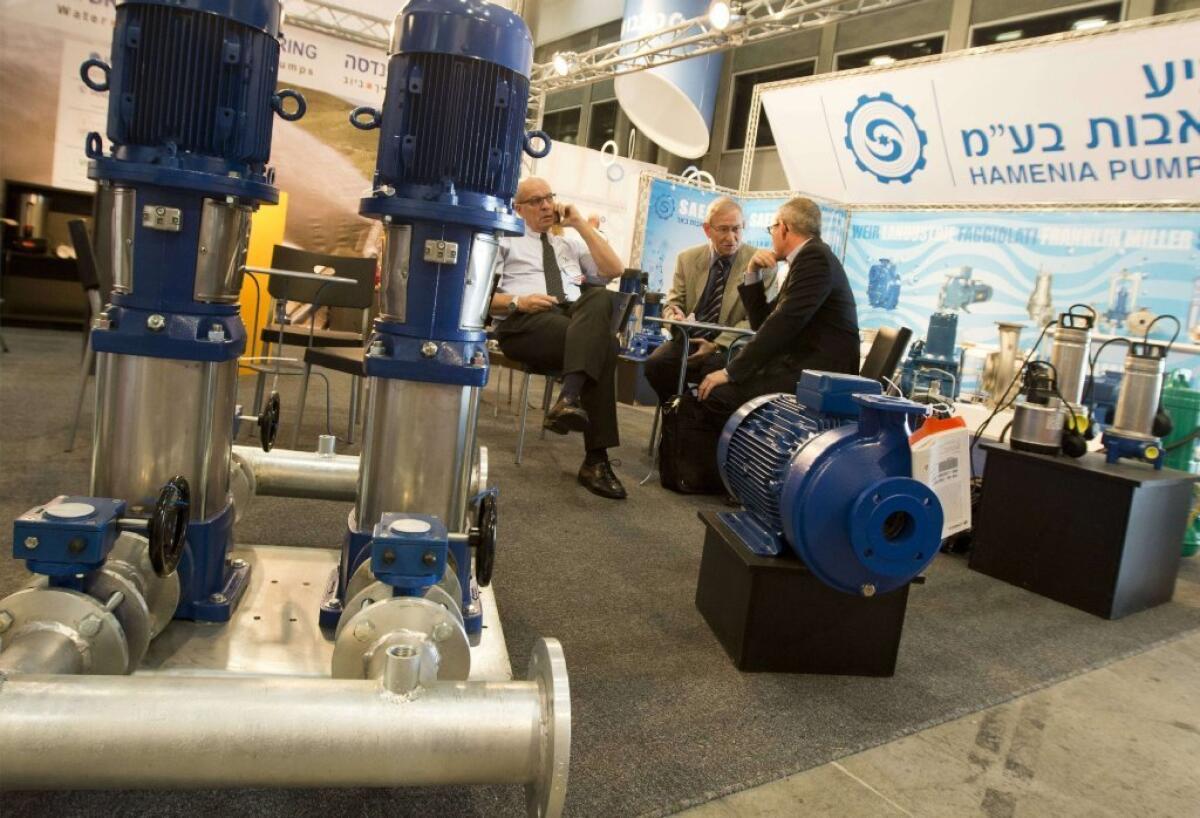A water war in Israel? Hardly.

- Share via
Detractors of Israel often seem so overtaken with critical fervor that they miss the truths that may seem obvious to more fair-minded observers of the Middle East.
Take, for example, Saree Makdisi’s attack on Israel for supposedly cutting off Palestinians’ access to water. He wrote in his Op-Ed article Monday that Israel uses 80% of the West Bank’s groundwater and makes it practically impossible for Palestinians to find new sources of water.
Such misleading claims do a disservice to the Palestinians by diverting attention from steps that can bring about a real improvement in water access for Palestinians. Israel can be instrumental in bringing about such an improvement. Genuine friends of the Palestinians would do well to inform themselves of the real water situation in Israel and the West Bank rather than be misled by the same tired diatribes to which we have regrettably grown accustomed. They’ll be surprised by what they discover.
ABOUT BLOWBACK: FAQs and submission policy
On the eve of the Six-Day War in 1967, the Palestinians had at their disposal 65 million cubic meters of natural freshwater per year. By 2006, because of intensive Israeli investment in water infrastructure in Palestinian areas and increased access to Israel’s supply, the figure was 180 million cubic meters.
Furthermore, Israel’s and the Palestinians’ per-capita water consumption rates have been steadily converging, with the current difference being about 30%. This has been due in part to Israel’s growing population, a prolonged drought and depleting groundwater sources. But it is also attributable to a very substantial improvement in water infrastructure in Palestinian areas.
In 1995, as part of the Oslo Accords, Israel and the Palestinians signed a water agreement, which is still in force. The Joint Water Commission (JWC) established by this agreement still meets several times a year to deliberate on matters of mutual interest. The work of the JWC is regularly monitored and reported to the international community.
Despite the fact that Israel has scrupulously abided by the agreement and has over the years even gone significantly beyond it in the Palestinians’ favor, Israel still finds itself being unfairly maligned for exploiting the mountain aquifer beneath Judea and Samaria. The sad truth is that Israel’s efforts to assist the Palestinians in improving the water and sewage systems in Judea and Samaria and Gaza have largely been met with politically motivated refusal, causing severe damage to the environment shared by both sides. A welcome exception has been a sewage treatment project in the Hebron area, in which Israeli and Palestinian water authorities, with international partners, have succeeded in reducing local sewage pollution. This is an important example that illustrates what can be achieved when reflexive animosity gives way to common sense.
More broadly, Israel is a world leader in water technology, management and monitoring. Just last month the governors of Nevada and Texas were among the 5,000 attendees at WATEC, Israel’s world-renowned water technology conference. Israel’s water reclamation rate of 75% is the world’s highest; the second-place nation hovers at about 12%. Israel’s agricultural sector is a pioneer in water efficiency, having developed innovative drip-irrigation techniques that revolutionized modern food production.
Israeli scientists have been instrumental in developing cutting-edge desalination technologies, and Israel now houses the world’s two largest reverse-osmosis desalination plants. The Israeli company that built them is currently designing what will be the largest desalination plant in the United States, in nearby Carlsbad.
Such technologies can be revolutionary. Until just recently, Israel was perpetually on the verge of a major water crisis. Desalination has essentially resolved the problem, and Israel’s water future now looks brighter than ever.
This has enormous potential for the Middle East at large and is especially propitious for the Palestinians, who face severe challenges regarding water. A combination of proper pipe maintenance, introduction of water reclamation technologies and desalination could have an enormously positive effect on the Palestinians’ water use. Imagine if even a fraction of the energy devoted by the Palestinians and their ostensible supporters to making misleading claims about Israel were devoted to cooperation on water infrastructure. The region’s water scarcity could be a thing of the past.
Israel’s “water bashers” might want to listen to Jay Famiglietti, the expert on water technology who heads UC Irvine’s Hydrology & Climate Research Group. Last year, Famiglietti and a team of researchers visited Israel, the West Bank and Jordan. Referring to Israel’s water management system as “a well-oiled, robust machine,” Famiglietti said: “For Israel, there are clear economic and political benefits for improved water management in Palestine and Jordan. With any luck, water management will come forward as an issue of mutual interest for regional cooperation.”
Would that Israel’s most strident critics listen to such a voice of reason.
ALSO:
Goldberg: Oprah, Obama and the racism dodge
Fear and loathing and cycling in L.A.: Tales of a bike commuter
Uri Resnick is the deputy consul general of Israel in Los Angeles.
If you would like to write a full-length response to a recent Times article, editorial or Op-Ed and would like to participate in Blowback, here are our FAQs and submission policy.
More to Read
A cure for the common opinion
Get thought-provoking perspectives with our weekly newsletter.
You may occasionally receive promotional content from the Los Angeles Times.









